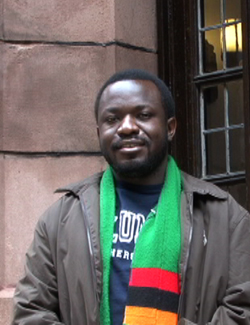Filed Under > TC People
Adrian Chipindi: Learning the Dance
Adrian Chipindi: Learning the Dance
Zambia is one of the world’s leading producers of copper, and for decades the southern African nation’s economic fate has hinged on world prices for that metal.
Adrian Chipindi believes that his country’s other abundant precious resource may ultimately be more sustainable.
“We have thousands of artists, dancers, musicians,” he says. “But there is no one who can bring these things together. We don’t even have a ministry of arts and culture.”
Chipindi, who has come to TC on a Fulbright scholarship to change that script. The first step, he believes, is to acquire the know-how to run arts organizations, marketing the arts, and develop audiences, which is why he is pursuing an M.A. in Arts Administration. “The arts are competing with a million different things: English league football on television, video games, all these things.”
Indeed, the arts have rarely been a principal focus for developing countries, which generally have more urgent issues to address, such as industrial policy, poverty reduction, or primary health. Still, says Chipindi, who served on Zambia’s national arts council after studying English and drama at the University of Zambia, there has been a growing realization that the arts can be just as important to development as agriculture or mining.
At TC, Chipindi says, he will be studying the organization of arts groups as well as the legal and financial context of arts administration, including through classes at Columbia Business School. For his internship, he hopes to work with foundations or arts councils, gaining vital experience he can bring back home.
Chipindi is confident that everything he learns about arts administration here in the United States will find a use when he returns to Zambia. “Although the context varies, the principles are basically the same,” he says. “We have a different funding structure, and I am aware of these differences. But the principles of marketing, for example, are the same.”
His journey to TC is Chipindi’s first trip to the United States, and he says he is still in awe of New York City—particularly its rich museums and lavish arts programming: “There are thousands of plays and concerts every day!”
As he navigates the university and the city, Chipindi says he constantly bears in mind the words of his mentor in Zambia, a professor of dance and ethnomusicology who recently passed away.
“He used to tell me, ‘Adrian, look at all these artists, there are so many of them and they really need your help,’” Chipindi says. “I feel so passionate about this. I want to work and work and help artists have a better life.”
Published Friday, Oct. 7, 2011
